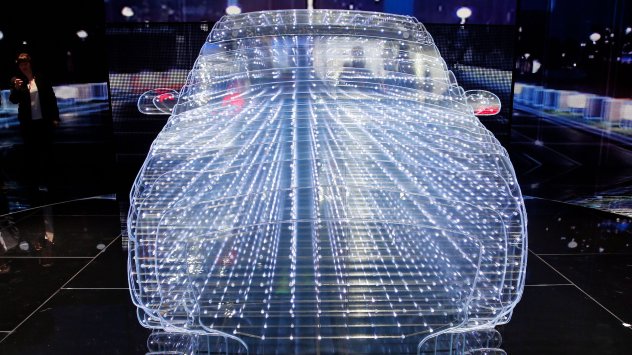
By Ivaylo Chaushev
The start of the year has brought a wave of optimism to financial markets, with major indices in Europe and the United States soaring to unprecedented heights. Amid this financial euphoria, one sector has notably failed to catch the upward momentum: the electric vehicle (EV) industry. The S&P U.S. & China Electric Vehicle Index has seen a decline of 5% since the year's start. The last few months have been full of developments within the sector, including a notable price war picking up steam and slowing growth.
Despite record-breaking EV sales in Europe in the past year, there's an emerging trend of slowing growth. This slowdown is attributed to a weakening demand and the pressure on manufacturers to increase their EV offerings. The European Automobile Manufacturers’ Association highlighted a 16.9% drop in EV sales this December compared to the previous month with a significant downturn in Germany (-47.6%), marking the first decline since April 2020. Despite annual sales seeing a 37% increase to 1.5 million vehicles or a 14.6% market share, the recent data shows that demand is slowing down. Adding to the concerns, Hertz Global Holdings, the American car rental company, announced it would be dumping around 20,000 electric vehicles from its U.S. fleet, including Teslas, in favour of gas-powered vehicles.
Historically, EV sales have been buoyed by affluent early adopters and corporate purchases, with incentives like tax breaks and subsidies. The next wave of buyers, crucial for sustained market growth, will need reassurances regarding range, depreciation, and overall affordability. The industry is currently grappling with challenges such as unsold inventories and operational inefficiencies, which have led to negative perceptions of EVs.
In an attempt to address these challenges and stimulate demand, major manufacturers like Tesla, Ford, VW, Renault, and others have started aggressive price cuts, essentially leading to a price war. This strategy has prompted investment banks and researchers to revise their sales forecasts and market projections through 2030. Factors such as the withdrawal of incentives and the need for more affordable EV options contribute to the negative sentiment. Speaking of affordable, China’s leading EV manufacturer BYD with its aggressive expansion and market shift towards smaller, less profitable SUV models makes it difficult for the western manufacturers to handle the increasing challenges. As they are struggling, BYD is slowly creeping in.
BYD has even overtaken Tesla in the sales of battery-only cars for the first time during the last quarter. The Chinese manufacturer sold 526 thousand units, surpassing Tesla's 484 thousand units, which sends a strong warning to its western counterparts. The company managed to do that mainly because its vehicles, generally offered at a lower price point, are more affordable, and their quality is not to be underestimated. In a bid to expand their global footprint, BYD plans to bolster its presence in Europe by launching new models such as the U9 supercar marketed as a direct competitor to Ferrari and by plans for constructing a factory in Hungary.
Meanwhile, Tesla, the dominant force in the EV market, grapples with supply chain constraints, including shortages of lithium, an absolutely crucial component for EV batteries. In contrast, BYD is proactively securing its lithium supplies through investments in mines and exploration activities in Africa and South America, effectively eliminating these constraints.
The increasing prominence of China as a leading EV producer coincides with the critical U.S. elections. With the presidential election year unfolding, likely featuring President Joe Biden and Donald Trump as contenders, the competition within the EV market and the state of China-U.S. trade relations are poised to become often debated campaign issues. This is especially relevant considering President Biden’s administration protectionist measures aimed at limiting subsidies for EVs containing significant Chinese components. These measures, however, are not as successful as hoped, and more serious ones might be introduced, as we enter the more aggressive campaigning period.
The declining prices of used EVs as a result of the full-scale price war are also hurting the market. A report from Recurrent indicates a significant drop in the overall U.S. used EV market pricing, with an average price 32% lower than the previous year. This depreciation has forced carmakers to even compensate leasing companies for the reduced value of used electric cars. With leasing companies now demanding concessions from EV makers to safeguard against further market depreciation and increased unwillingness of people to buy a new car which depreciates much faster than its fuel based or hybrid counterparts, the demand side continues to diminish. The replacement cost of a battery is most certainly not helping to tip the scale in favour of EVs, as for example a four-module replacement battery for Tesla varies between $20 000 and $28 000.
Rivian Automotive Inc., the U.S. EV manufacturer, is a great example for the struggles faced by the EV sector. Once crowned as a Wallstreet’s darling, Rivian's stock has plummeted over 90% since its initial public offering and the high price points of its vehicles, starting at nearly $70,000, crushed their appeal to the average buyer. With a reported net loss of $1.52 billion for the last quarter, Rivian is betting on its more affordable R2 model to stay afloat. However, concerns about its success remain.
Adding to the gloomy mood in the sector, Apple made a strategic decision to cancel its electric car project, known internally as Project Titan. The project, which began a decade ago, was met with high expectations and speculation regarding a potential vehicle release as early as 2024 or 2025. Several employees associated with Project Titan will be reassigned to Apple's artificial intelligence (AI) division, indicating a shift towards strengthening the company's capabilities in a domain where competitors like Alphabet and Microsoft have made significant progress. Apple's decision to cancel its EV project and focus more on AI reflects a wider industry revaluation of investments in fully battery-powered vehicles.
With the current price war, intense competition, economic situation, consumer sentiment, and political pressures, the industry is anticipated to undergo consolidation in the near future. It's likely that some of the competitors may exit the market, and the enduring success of companies within this sector will hinge on sustained government backing, innovation, and strategic adaptations. Only those companies that effectively embrace these measures will persevere in revolutionizing how we drive.



